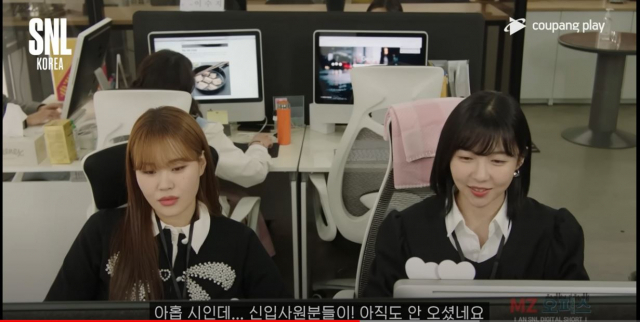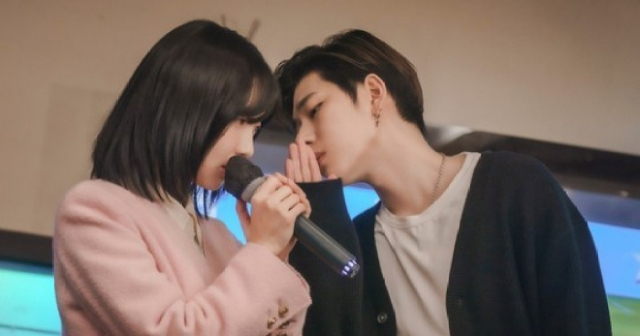Gen Z vs Gen Z: How their enemies at work are now themselves
By Jung Min-kyungPublished : Dec. 25, 2022 - 15:21

For millennials and Generation Z – those who were born between the early 1980s to early 2010s, respectively – clashing with their bosses at work has been popular material for television comedy in South Korea over the past few years. But recently, the skits took a new turn, with many of them poking fun at how their real enemy at work is not their bosses, but themselves.
Saturday Night Live Korea’s new segment “MZ Office” – with “MZ” referring to millennials and Gen Z in Korea – has amassed nearly 4 million views since it was uploaded on YouTube on Nov. 27.
The segment distinguishes itself from similar sketches by depicting bosses as bystanders and shedding light on passive aggressive confrontations among millennials and Gen Z through internal monologues.
A recent episode begins with comedian and actress Joo Hyun-young playing an MZ office worker “vlogging” in her office, where she has worked for two years. She casually tries to get her bosses and colleagues to appear in her vlog, but ends up annoying a male colleague who doesn’t want to.
Then Joo gets passive aggressively accused by her colleague as a “kkondae” -- a term that refers to a condescending older person in Korean – after she points out that the new recruits hadn’t arrived on time in the morning.
In the episode's last scene, the boss suggests, "How about we all get some Starbucks coffee?" Instead of offering to get the coffee as junior staff are often expected to, the new recruits say that they want Iced Americanos. The other MZ staff awkwardly smile while cursing to themselves until finally the only male employee grudgingly offers to go.
In the following episode of the segment, the team has a “hoesik” – a dinner gathering with co-workers – during which they go to a karaoke room. Rapper Zico, a guest-star of the show who plays a newcomer in the team, starts singing and Joo joins in. The act of a colleague joining in to sing together at a karaoke is normally viewed as a sign of support and comradeship during hoesik, but Zico eventually lashes out at Joo, accusing her of “stealing his thunder,” making everyone’s jaws drop.
The ‘young kkondae’ dilemma
In recent years, the rise of “young kkondaes” has become a major topic of conversation in Korea. The term "kkondae" is widely used among Koreans to refer to baby boomers who create an uncomfortable workplace dynamic through their condescending and authoritarian attitude. However, this term has evolved to include all age groups.
Young kkondaes are millennials or Gen Z who demand absolute obedience from fellow millennial or Gen Z colleagues, despite being only a few years apart in age or career experience.
The “MZ Office” constantly uses the word to describe a situation where Joo or her colleague try to ask newcomers to do chores or pressure them to follow office rules set by their bosses. Joo is often surprised to find herself acting that way, lamenting that she has become a “kkondae” herself.

“Everyone can become a kkondae regardless of age,” Lim Myung-ho, professor of psychology at Dankook University in Seoul said.
“It stems from an inferiority complex that humans have as a member of society,” he added.
Young kkondaes have become such a big social phenomenon that the issue appeared on an episode of SBS TV’s Circle House, a talk show led by star psychiatrist and university professor Oh Eun-young, in March.
The episode divided the panels into two teams – “young kkondaes” and “the new MZ generation” – and showed that the participants had very different views toward various situations in their office lives, despite being only a few years apart in age.
On the topic of “arriving at work on time,” the young kkondae team said that all workers should come to work at least 10 minutes before the shift starts. The new MZ team refuted by saying that the time mentioned in their contract should be the time they arrive at work.
Lim says that making an effort to understand each other is the key to bridging the gap.
“It’s important to think about the needs of your colleagues in the office as much as what you want. Understanding is the key.”
A shallow depiction
While the latest SNL sketch may be harmless entertainment, cultural critic Kim Sung-soo thinks otherwise.
“It’s such a shallow depiction of the struggles and dilemmas that the Korean MZ generation go through at work,” Kim told The Korea Herald last week.
“They’re at a stage where they feel like they need to adapt to the existing hierarchical work environment here, but at the same time they know that the company can lay them off anytime because they’ve seen their parents' generation lose their jobs.”
In reality, an increasing number of millennials and Gen Zs are leaving Korean companies to “pursue their dreams.” Some 49 percent of 500 Korean companies said that they’re seeing a “high number of MZ generation employees quitting within a year, according to a survey conducted by online job portal Saramin in end of 2021.
“They’re stuck in this place where they feel like every path they choose is the wrong answer. The SNL skit only deals with problems on the surface, but they should acknowledge the mentality of the MZs to create a better sketch,” Kim said.








![[Graphic News] More Koreans say they plan long-distance trips this year](http://res.heraldm.com/phpwas/restmb_idxmake.php?idx=644&simg=/content/image/2024/04/17/20240417050828_0.gif&u=)
![[KH Explains] Hyundai's full hybrid edge to pay off amid slow transition to pure EVs](http://res.heraldm.com/phpwas/restmb_idxmake.php?idx=644&simg=/content/image/2024/04/18/20240418050645_0.jpg&u=20240419100350)






![[From the Scene] Monks, Buddhists hail return of remains of Buddhas](http://res.heraldm.com/phpwas/restmb_idxmake.php?idx=652&simg=/content/image/2024/04/19/20240419050617_0.jpg&u=20240419175937)

![[KH Explains] Hyundai's full hybrid edge to pay off amid slow transition to pure EVs](http://res.heraldm.com/phpwas/restmb_idxmake.php?idx=652&simg=/content/image/2024/04/18/20240418050645_0.jpg&u=20240419100350)

![[Today’s K-pop] Illit drops debut single remix](http://res.heraldm.com/phpwas/restmb_idxmake.php?idx=642&simg=/content/image/2024/04/19/20240419050612_0.jpg&u=)